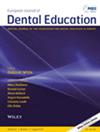Assessment of dental students' knowledge of infection control and prevention during the COVID-19 pandemic
Abstract
Introduction
Since the start of the COVID-19 pandemic, new guidelines for dental practice were published. This research aims to examine the knowledge of dental students and their attitudes towards current guidelines.
Materials and methods
The study involved 76 fourth-year dental medicine students from three public universities in Croatia. A survey questionnaire was developed based on in-depth interviews and a pilot pretesting. The online questionnaire consisting of 36 questions was published using Google Forms. The survey data were analysed using Microsoft Excel and presented with descriptive statistics.
Results
Survey data showed the dental students' knowledge of the guidelines for dental practices is at an insufficient level (average score of 67% correct answers). Students who have come across the guidelines outside the faculty environment through assistantships have demonstrated lesser knowledge (65%) of the guidelines than the ones who do not (68%). A similar trend is observed with dental students who grew up in a family of doctors of dental medicine (61%) and ones who did not (68%). Students also independently assessed their knowledge of the guidelines as moderate (3.15 out of 5), while evaluating the application of current guidelines as very important (4.38 out of 5).
Conclusion
Awareness of dental students should be improved by adapting the curriculum of dental studies and increasing the availability of information on current guidelines. Dental students need to be motivated to independently inform themselves about the current guidelines for dental practices, thus improving their clinical work.

 求助内容:
求助内容: 应助结果提醒方式:
应助结果提醒方式:


